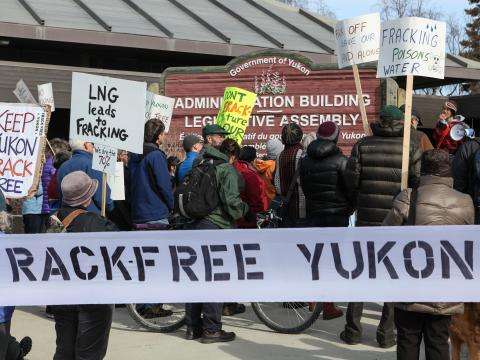Harnessing 'local' concerns can fuel broader environmental movements

A new study by political scientists at the University of Toronto and Duke University illustrates how activists can strategically adopt local concerns to fuel greater support for broader environmental campaigns.
"Many big environmental movements or campaigns are based on future concerns or global issues that often seem abstract or distant. Our case study shows how harnessing local, place-based concerns helps activists gain currency by giving people a concrete example of the problem they can relate to," says Kate Neville, assistant professor of environmental politics at the University of Toronto.
"This is not a novel strategy; it happens a lot. But our study shows why it's so effective," Neville says.
The new paper – published this month in the peer-reviewed journal Environmental Politics – focuses on local activists' use of a neighborhood siting dispute to crystalize and drive support for a region-wide anti-fracking campaign in Canada's Yukon Territory.
When the Yukon Energy Corporation received approval in 2014 to build two new liquefied natural gas (LNG) backup power generators to replace outdated diesel generators in the territorial capitol of Whitehorse, some residents protested the decision, citing fears about public safety and concerns about the cost of the new generators and the increased traffic and noise they might cause.
Local anti-fracking community organizers capitalized on these concerns by linking the construction of the LNG power generators to controversial proposals then being debated by the territorial government that would open the Yukon Territory to shale gas extraction and hydraulic fracturing. Although the two issues initially seemed unrelated, the activists argued that if the utility switched to liquefied natural gas generators at its Whitehorse facility, it would create an increased market for locally sourced gas.
"The backup generators became a symbol of the wider fight against fracking," says Erika Weinthal, Lee Hill Snowdon Professor of Environmental Policy at Duke's Nicholas School of the Environment.
Much of the proposed shale gas extraction would have occurred in remote and sparsely populated areas, Weinthal notes, but by linking it to the concerns in Whitehorse and to broader concerns about fracking's reported impacts on environmental quality elsewhere, the activists were able to strategically reframe fracking as a "local" issue for people throughout the territory, including those in the Whitehorse area, where roughly 27,000 of Yukon's 36,000 total residents live.
"People often use the pejorative term NIMBYism – not in my backyard – to describe community protests where the selfish interests of a few eclipse the broader public good. That was not what we saw in this case," Neville says. "If the issue was solely a siting dispute or a debate about the pros and cons of liquefied natural gas versus diesel, it is unlikely it would have generated such ongoing and widespread activism that continued even after the construction of the new generators began."
By redrawing the boundaries of what a local issue is, and identifying a visible symbol of it that a wide base of people can rally around, environmental activists make it easier for the public to understand and support a campaign, she says. It becomes less abstract and remote.
These same tactics also make it harder for people on the other side of the issue to dismiss the activism as outside agitation.
"It's all about alliance building and reimagining the local as global," Neville says.
"Although our case study focuses on the anti-fracking movement in the Yukon, what we show is applicable far beyond this one issue or location," Weinthal emphasizes. "It's a strategy that can be used to mobilize support and raise concern about environmental issues anywhere."
More information: Kate J. Neville et al. Scaling up site disputes: strategies to redefine 'local' in the fight against fracking, Environmental Politics (2016). DOI: 10.1080/09644016.2016.1154124
Provided by Duke University



















